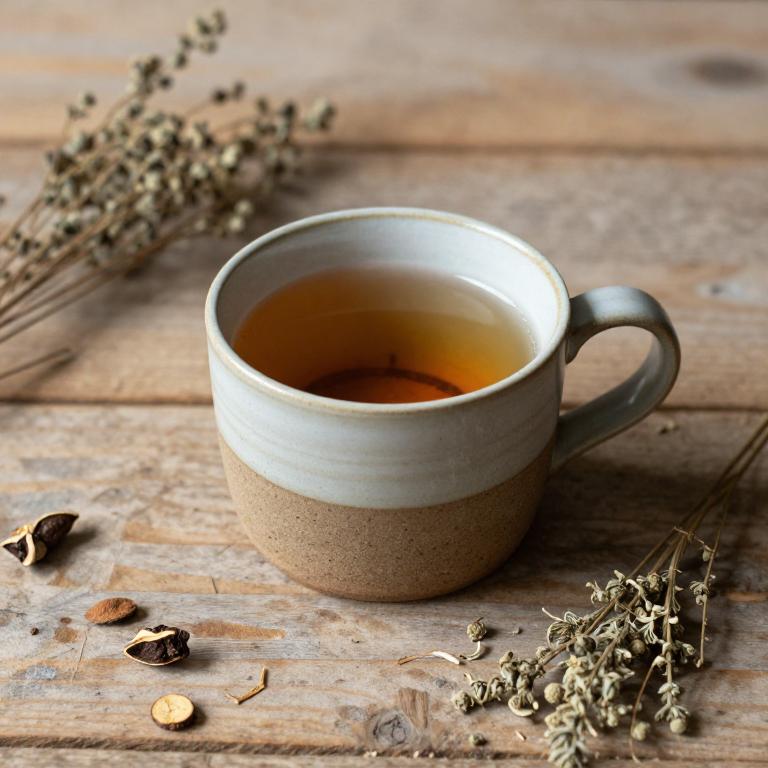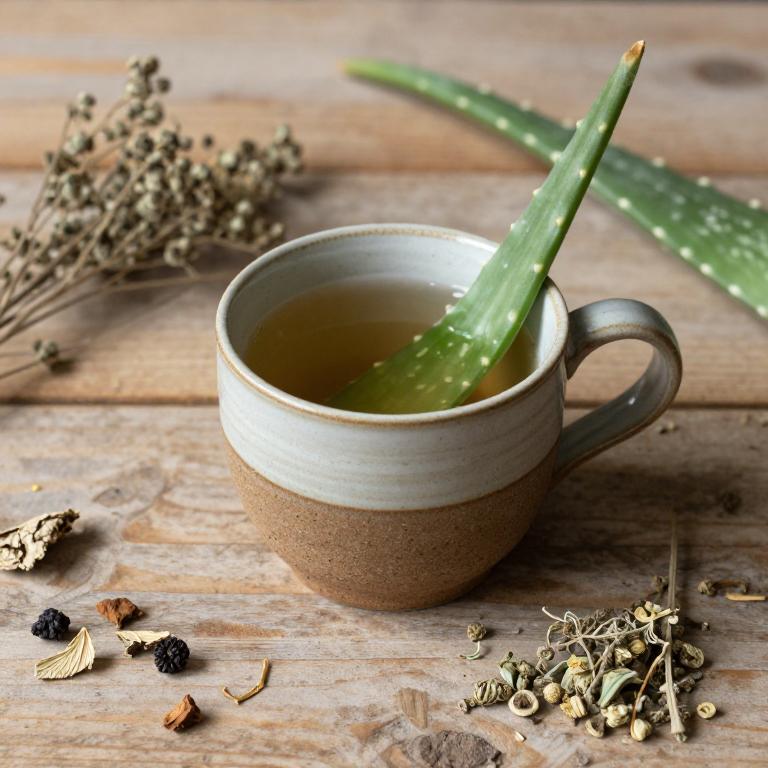10 Best Herbal Teas For Oral Thrush

Herbal teas can be a natural and soothing remedy for oral thrush, a fungal infection caused by Candida albicans.
Teas made from ingredients like echinacea, sage, and licorice root are often recommended for their antimicrobial and anti-inflammatory properties. These herbal infusions can help reduce the discomfort of sores and inflammation in the mouth while supporting the body's natural defenses. However, it's important to consult with a healthcare provider before using herbal teas, especially for individuals with underlying health conditions or those taking medications.
While herbal teas may offer relief, they should not replace professional medical treatment for persistent or severe cases of oral thrush.
Table of Contents
- 1. Echinacea (Echinacea purpurea)
- 2. St. john's wort (Hypericum perforatum)
- 3. Ceylon cinnamon (Cinnamomum verum)
- 4. Thyme (Thymus vulgaris)
- 5. Camellia (Camellia sinensis)
- 6. Stinging nettle (Urtica dioica)
- 7. Salvia (Salvia officinalis)
- 8. Licorice (Glycyrrhiza glabra)
- 9. Aloe vera (Aloe barbadensis)
- 10. English lavender (Lavandula angustifolia)
1. Echinacea (Echinacea purpurea)

Echinacea purpurea, commonly known as purple coneflower, is a popular herbal remedy often used in teas to support immune function and combat infections.
While it is not a direct treatment for oral thrush, which is caused by the fungus Candida albicans, some studies suggest that echinacea may help reduce the severity of fungal infections by boosting the immune system. Herbal teas made from echinacea can be consumed as part of a holistic approach to managing oral thrush, along with proper oral hygiene and antifungal treatments. However, it is important to consult a healthcare provider before using echinacea, especially for individuals with autoimmune disorders or those taking immunosuppressive medications.
Despite its potential benefits, echinacea should not replace prescribed antifungal therapies for oral thrush.
2. St. john's wort (Hypericum perforatum)

Hypericum perforatum, commonly known as St. John's Wort, is a herbal remedy that has been traditionally used for various ailments, including mood disorders and skin conditions.
While it is not a primary treatment for oral thrush, some studies suggest that its antimicrobial properties may help reduce fungal overgrowth in the mouth. The active compounds in St. John's Wort, such as hypericin and hyperforin, are believed to have antifungal effects that could support conventional treatments. However, it is important to note that St. John's Wort can interact with many medications, so it should be used under the guidance of a healthcare professional.
As with any herbal remedy, it is best to consult a doctor before using it for oral thrush, especially if you are on other medications or have underlying health conditions.
3. Ceylon cinnamon (Cinnamomum verum)

Cinnamomum verum, commonly known as true cinnamon, has been traditionally used in herbal teas to support oral health, including the management of oral thrush.
The essential oils in cinnamon, particularly cinnamaldehyde, possess antifungal properties that may help inhibit the growth of Candida albicans, the primary cause of oral thrush. When consumed as a warm herbal tea, cinnamon can soothe soreness and reduce inflammation in the mouth, providing relief from discomfort associated with the condition. However, it is important to note that while cinnamon may offer supportive benefits, it should not replace conventional antifungal treatments prescribed by a healthcare provider.
As with any herbal remedy, it is advisable to consult a medical professional before using cinnamon tea for oral thrush, especially for individuals with allergies or underlying health conditions.
4. Thyme (Thymus vulgaris)

Thymus vulgaris, commonly known as thyme, is a popular herb used in herbal teas to support oral health, particularly in the management of oral thrush.
The essential oils in thyme, especially thymol, possess strong antifungal properties that can help combat Candida albicans, the primary cause of oral thrush. When brewed into a tea, thyme can be soothing to the mouth and throat, providing relief from discomfort and inflammation associated with the condition. It is often recommended as a complementary therapy alongside conventional treatments for mild cases of oral thrush.
However, it is important to consult a healthcare provider before using thyme tea, especially for individuals with known allergies or those taking medications.
5. Camellia (Camellia sinensis)

Camellia sinensis, the plant from which green and black teas are derived, contains bioactive compounds that may support oral health and potentially help manage oral thrush.
These compounds, including polyphenols and catechins, have antimicrobial properties that can inhibit the growth of Candida albicans, the primary fungus responsible for oral thrush. While herbal teas made from Camellia sinensis are not a substitute for medical treatment, they may serve as a complementary approach to reduce symptoms and promote a healthier oral environment. Some studies suggest that regular consumption of green tea may enhance the body's natural defenses against fungal infections.
However, it is important to consult a healthcare provider before using herbal teas as part of a treatment plan for oral thrush.
6. Stinging nettle (Urtica dioica)

Urtica dioica, commonly known as stinging nettle, has been traditionally used in herbal medicine for its anti-inflammatory and antimicrobial properties.
While it is not a primary treatment for oral thrush, some studies suggest that stinging nettle tea may help reduce inflammation and support immune function, which could aid in the body's fight against fungal infections. The tea is typically prepared by steeping fresh or dried leaves in hot water, and it is often consumed as part of a broader holistic approach to health. However, it is important to consult with a healthcare provider before using stinging nettle tea, especially for individuals with existing health conditions or those taking medications.
As with any herbal remedy, the effectiveness of urtica dioica for oral thrush may vary, and it should not replace prescribed antifungal treatments.
7. Salvia (Salvia officinalis)

Salvia officinalis, commonly known as sage, has been traditionally used for its antimicrobial and antifungal properties, making it a potential natural remedy for oral thrush.
Herbal teas made from dried sage leaves can be prepared by steeping them in hot water for several minutes, allowing the active compounds to infuse into the liquid. These teas may help reduce the symptoms of oral thrush by inhibiting the growth of Candida albicans, the primary fungal cause of the infection. However, it is important to consult with a healthcare provider before using sage tea as a treatment, especially for individuals with existing health conditions or those taking medications.
While sage tea may offer some relief, it should not replace professional medical advice or prescribed antifungal treatments.
8. Licorice (Glycyrrhiza glabra)

Glycyrrhiza glabra, commonly known as licorice root, has been traditionally used in herbal medicine for its potential antifungal properties, making it a popular ingredient in herbal teas for oral thrush.
The root contains compounds like glycyrrhizin and flavonoids, which may help inhibit the growth of Candida albicans, the primary fungus responsible for oral thrush. When brewed into a tea, licorice root can soothe sore tissues in the mouth and provide a mild antiseptic effect, supporting the body's natural healing process. However, it is important to note that licorice root should be used in moderation, as excessive consumption may lead to side effects such as hypertension due to its effects on sodium retention.
As with any herbal remedy, it is advisable to consult a healthcare professional before using licorice root tea, especially for individuals with existing health conditions or those taking medications.
9. Aloe vera (Aloe barbadensis)

Aloe barbadensis, commonly known as aloe vera, has been traditionally used for its soothing and antimicrobial properties, making it a potential natural remedy for oral thrush.
Herbal teas made from aloe vera can help reduce inflammation and discomfort in the mouth, providing relief from the symptoms of fungal infections like oral thrush. While scientific evidence supporting its efficacy for oral thrush is limited, some studies suggest that aloe vera may inhibit the growth of Candida, the fungus responsible for the condition. These teas are often prepared by steeping dried aloe leaves in hot water, and they can be consumed as part of a holistic approach to managing oral health.
However, it is important to consult a healthcare provider before using aloe vera tea, especially for individuals with underlying health conditions or those taking medications.
10. English lavender (Lavandula angustifolia)

Lavandula angustifolia, commonly known as English lavender, has been traditionally used in herbal teas to support oral health, including the management of oral thrush.
This herb contains antimicrobial and antifungal properties that may help reduce the overgrowth of Candida albicans, the primary cause of oral thrush. When brewed into a calming herbal tea, lavender can soothe inflammation and promote a sense of well-being while potentially aiding in the reduction of fungal infections in the mouth. It is often combined with other herbs like echinacea or calendula to enhance its therapeutic effects.
While lavender tea is generally considered safe, it should be used as a complementary treatment alongside conventional medical care for persistent or severe cases of oral thrush.